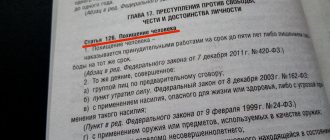The concept of rehabilitation in criminal proceedings and the grounds for the emergence of the right to rehabilitation
Rehabilitation is a procedure for restoring the rights and freedoms of a person illegally or unreasonably subjected to criminal prosecution, and compensation for the harm caused to him (clause 34 of Article 5 of the Code of Criminal Procedure of the Russian Federation). At the stage of pre-trial and judicial proceedings, officials of procedural bodies may make mistakes that cause harm to individuals and legal entities, and therefore, the legislation of the Russian Federation provides for the restoration of the rights of citizens (legal entities) who were harmed during criminal prosecution, the application of measures procedural coercion or conviction. The intersectoral legal multi-stage institution of rehabilitation in criminal proceedings is a set of homogeneous legal norms that regulate: the grounds for the emergence and recognition of the right to rehabilitation; types of damage subject to compensation, including to legal entities; the procedure for appealing the decision to make payments and restoring other rights of the rehabilitated person. The specificity of compensation for harm to a rehabilitated person is that compensation is made by the state, that is, at the expense of the treasury of the Russian Federation, in full, regardless of the guilt of the inquiry body, investigator, prosecutor and court. The damage to the rehabilitated person is compensated only from the federal treasury. By virtue of Art. 1071 of the Civil Code, in cases where the damage caused is subject to compensation at the expense of the treasury of the Russian Federation, the Ministry of Finance of the Russian Federation acts on its behalf. In accordance with Part 3 of Art. 1081 of the Civil Code, in the event of compensation for damage caused by an official of the bodies of inquiry, preliminary investigation, prosecutor's office or court, the state has the right of recourse to this person if his guilt is established by a court verdict that has entered into legal force, that is, if the damage was caused as a result of committing crimes. According to Part 1 of Art. 133 of the Code of Criminal Procedure of the Russian Federation, the right to rehabilitation contains three components:
- the right to compensation for property damage;
- the right to eliminate the consequences of moral damage;
- the right to restoration of labor, pension, housing and other rights.
The law provides for unequal procedures for compensation for various types of damage and restoration of other rights (see Articles 135-139 of the Code of Criminal Procedure of the Russian Federation).
Criminal prosecution is a procedural activity carried out by the prosecution in order to expose a suspect accused of committing a crime (clause 55 of Article 5 of the Code of Criminal Procedure of the Russian Federation).
Subjects of rehabilitation, in accordance with Part 2, 2.1 and 3 of Art. 133 of the Code of Criminal Procedure of the Russian Federation are:
- A defendant who has been acquitted on any of the grounds specified in Parts 2 and 8 of Art. 302 of the Code of Criminal Procedure of the Russian Federation (for example, the event of a crime has not been established, the defendant is not involved in the commission of a crime, there are no signs of a crime in the defendant’s act).
- A defendant whose criminal prosecution has been terminated due to the abandonment of charges by a public or private prosecutor. During the trial, the public prosecutor has the right to withdraw charges in accordance with Part 7 of Art. 246 Code of Criminal Procedure of the Russian Federation. In criminal cases of private prosecution, the failure of the victim to appear without valid reasons entails the termination of the criminal case on the grounds provided for in paragraph 2 of Part 1 of Art. 24 of the Code of Criminal Procedure of the Russian Federation (Part 3 of Article 249 of the Code of Criminal Procedure of the Russian Federation). Termination of a criminal case at a court hearing occurs under paragraph 2 of Art. 254 Code of Criminal Procedure of the Russian Federation.
- A suspect or accused, the criminal prosecution against whom has been terminated: due to the absence of a crime (clause 1, part 1, article 24 of the Code of Criminal Procedure of the Russian Federation); for the absence of corpus delicti in the act (clause 2, part 1, article 24 of the Code of Criminal Procedure of the Russian Federation); in the absence of a statement from the victim in cases of private and private-public prosecution (clause 5, part 1, article 24 of the Code of Criminal Procedure of the Russian Federation); in the absence of the court's consent to initiate a criminal case or to involve as an accused a member of the Federation Council and a deputy of the State Duma, the Prosecutor General, a judge of the Constitutional Court, the Supreme Court, the Supreme Arbitration Court of the Russian Federation, a judge of a federal court of general jurisdiction and a federal arbitration court, and other judges, a deputy of a legislative (representative) body of state power of a subject of the Federation, an investigator, a lawyer, a prosecutor (clause 6, part 1, article 24 of the Code of Criminal Procedure of the Russian Federation); due to the non-involvement of the suspect or accused in the commission of a crime (clause 1, part 1, article 27 of the Code of Criminal Procedure of the Russian Federation); due to the existence of a final verdict against the suspect or accused on the same charge or a court ruling or a judge’s decision to terminate the criminal case on the same charge (clause 4, part 1, article 27 of the Code of Criminal Procedure of the Russian Federation); due to the presence in relation to the suspect or accused of an unreversed resolution of the inquiry body, investigator or prosecutor to terminate the criminal case on the same charge or to refuse to initiate a criminal case (clause 5, part 1, article 27 of the Code of Criminal Procedure of the Russian Federation); due to the refusal of the State Duma of the Federal Assembly of the Russian Federation to give consent to the deprivation of immunity of the President of the Russian Federation, who has ceased to exercise his powers, and (or) the refusal of the Federation Council to deprive the immunity of this person (Clause 6, Part 1, Article 27 of the Code of Criminal Procedure of the Russian Federation).
- Convict - in cases of complete or partial cancellation of a court conviction that has entered into legal force and termination of a criminal case due to his non-involvement in the commission of a crime (clause 1, part 1, article 27 of the Code of Criminal Procedure of the Russian Federation) or due to the absence of a crime (clause 1, part 1 Article 24 of the Code of Criminal Procedure of the Russian Federation); for the absence of corpus delicti in the act (clause 2, part 1, article 24 of the Code of Criminal Procedure of the Russian Federation); due to the expiration of the statute of limitations for criminal prosecution (clause 3, part 1, article 24 of the Code of Criminal Procedure of the Russian Federation); in connection with the death of a person, with the exception of cases when criminal proceedings are necessary for the rehabilitation of the deceased (clause 4, part 1, article 24 of the Code of Criminal Procedure of the Russian Federation); in the absence of a statement from the victim in cases of private and private-public prosecution (clause 5, part 1, article 24 of the Code of Criminal Procedure of the Russian Federation); due to the lack of court consent to initiate a criminal case or to involve as an accused a member of the Federation Council and a deputy of the State Duma, the Prosecutor General, a judge of the Constitutional Court, the Supreme Court, the Supreme Arbitration Court of the Russian Federation, a judge of a federal court of general jurisdiction and a federal arbitration court, others judges, deputy of the legislative (representative) body of state power of the subject of the Federation, investigator, lawyer, prosecutor (clause 6, part 1, article 24 of the Code of Criminal Procedure of the Russian Federation). To rehabilitate these persons, a “decision of the appellate court (sentence) made in accordance with clause 2, part 3 of Art. 367 of the Code of Criminal Procedure, the court of cassation (ruling), issued in accordance with paragraph 2 of part 1 of Art. 378 of the Code of Criminal Procedure of the Russian Federation or a supervisory court (ruling or resolution) issued in accordance with paragraph 2 of part 1 of Art. 408 of the Code of Criminal Procedure of the Russian Federation.”
- A person to whom compulsory medical measures were applied - in the event of the cancellation of an illegal or unfounded court order to apply this measure. Compulsory medical measures are provided for in Ch. 15 of the Criminal Code of the Russian Federation and 51 of the Code of Criminal Procedure of the Russian Federation.
- The person specified in paragraphs 1-4 of Part 2 of Art. 133 of the Code of Criminal Procedure of the Russian Federation, in criminal cases of private prosecution, if the criminal case was initiated in accordance with Part 4 of Art. 20 of the Code of Criminal Procedure of the Russian Federation, as well as those convicted in criminal cases of private prosecution, initiated by the court in accordance with Art. 318 of the Code of Criminal Procedure of the Russian Federation, in cases of complete or partial reversal of a court conviction and acquittal of a convicted person or termination of a criminal case or criminal prosecution on the grounds provided for in clauses 1, 2 and 5 of Part 1 of Art. 24 of the Code of Criminal Procedure of the Russian Federation and paragraphs 1, 4 and 5 of Part 1 of Art. 27 Code of Criminal Procedure of the Russian Federation.
- Any person who has been unlawfully subjected to procedural coercive measures in the course of criminal proceedings. In accordance with Art. 133 of the Code of Criminal Procedure of the Russian Federation, the grounds for the emergence of the right to rehabilitation, including the right to compensation for harm, are: a) criminal prosecution, which is a procedural activity carried out by the prosecution in order to expose a suspect accused of committing a crime (clause 55 of article 5 Code of Criminal Procedure of the Russian Federation); b) illegal application of procedural coercive measures to any person during criminal proceedings (Part 3 of Article 133 of the Code of Criminal Procedure of the Russian Federation).
Measures of procedural coercion are regulated by Section IV of the Code of Criminal Procedure of the Russian Federation, these include: detention of a suspect, preventive measures, other measures of procedural coercion (obligation to appear, arrest, temporary removal from office, seizure of property, monetary penalty). Taking into account the priority of human rights over the rights of the state (Articles 2 and 18 of the Constitution of the Russian Federation), judicial practice interprets the provisions of Part 3 of Art. 133 of the Code of Criminal Procedure of the Russian Federation is broad both in terms of the range of persons and in terms of types of coercive measures. In accordance with this norm, the right to compensation for harm is granted even to the accused (regardless of whether the results of his criminal prosecution are considered justified or unfounded), for example, when the preventive measure applied to him in the form of detention in connection with the reclassification of the crime for which this the preventive measure could not be applied. Despite the fact that in Ch. 4 of the Code of Criminal Procedure of the Russian Federation does not include among the coercive measures such coercive measures as a search of a home, seizure and other investigative actions carried out forcibly; harm caused by their illegal production is also subject to compensation. Moreover, when such harm is caused to “outsiders”, against whom criminal prosecution is not carried out.
The criminal procedural legislation (Part 4 of Article 133 of the Code of Criminal Procedure of the Russian Federation) provides that the right to rehabilitation is absent when the measures of procedural coercion applied to a person or the verdict of guilty are canceled or changed due to: a) the issuance of an amnesty act; b) expiration of the statute of limitations; c) not reaching the age at which criminal liability begins; d) retardation of a minor who has reached the age of criminal responsibility in mental development, not associated with a mental disorder, which did not allow him to fully understand the actual nature and social danger of his actions (inaction) and manage them at the time of committing the act provided for by criminal law; e) adoption of a law eliminating crime or punishability of an act, with the exception of cases of a court ruling provided for in paragraph 1 of Part 3 of Art. 125.1 Code of Criminal Procedure of the Russian Federation. It is important to emphasize that the right to compensation for harm arises not only in the case when actions were taken in relation to the rehabilitated person and decisions were made that were recognized as illegal or unfounded, but also in the event that the harm was caused as a result of actions that were legal and justified at the time of their execution, which , however, were associated with futile criminal prosecution.
Rehabilitation methods
There are many examples in history when violated rights were subject to compensation. An obvious exception is fascism, which is due to the presence of a large number of persons whose rights have been violated. Rehabilitation measures are carried out by compensating a person for harm. It is both material and moral in nature. In addition, various rights of citizens that were infringed are restored.
According to these provisions, a variety of methods can be distinguished:
- Compensation for damage of a property nature occurs. In this case, the provisions of Article 135 of the Code of Criminal Procedure should be taken into account. This norm stipulates that wages and other types of payments must be reimbursed. This also includes the payment of benefits that a person has lost due to the issuance of an act that is unlawful in nature. All expenses of the victim must be taken into account.
- Moral damage is compensated. The person’s suffering, which is of a moral nature, is taken into account.
- Other rights of the injured party are also subject to restoration.
If we talk about whether wages were not received for the period when criminal prosecution was applied against a person, then it is worth paying attention to the calculation regarding the date of termination of such accruals. When deciding on reimbursements, the periods that must be reimbursed are taken into account. In this case, the circumstances of the case are reflected, which in each case have individual significance.
When it comes to determining the amounts required for payment, the legislator does not limit the provisions regarding the number of persons entitled to protect the injured party. This means that a person can contact several legal consultants at the same time and have several lawyers.
The legislator does not limit the provisions in force regarding which list of expenses should be reimbursed. This group, among other things, includes expenses that a person incurred in order to eliminate the consequences that resulted from a violation of his powers.
The amounts are determined taking into account the indexation of prices existing on the market. The amounts that were in effect at the time of the violation of human rights are subject to assessment. Damage caused to the organization is subject to compensation in accordance with similar provisions.
When indicating the need for compensation for harm of moral significance, it is understood as human suffering. They have a moral and physical orientation. It should be borne in mind that there is a distinction between the fight against the consequences of the harm caused and its compensation, expressed in financial terms. Article 136 of the Code of Criminal Procedure talks about eliminating these consequences.
These include:
- the prosecutor apologizes to the victim on behalf of the state;
- information indicating the use of rehabilitation measures is published in the media;
- notifications are sent about the application of standards to the person.
Regarding apologies, it can be noted that they are made for various categories of cases, regardless of whether there is a public or private-public accusation. The obligation to make an apology is enshrined in the decision of the judicial authority.
If rights that were violated due to the criminal prosecution of a person are subject to restoration, then they are restored in full. When deciding on the issue of length of service, which is reflected in the process of assigning pension contributions, its full rehabilitation is subject, that is, the entire period while the person was in custody or other measures were applied to him - is subject to inclusion in such length of service.
In addition, experts pay special attention to the fact that the term of serving a sentence that is imposed illegally is subject to inclusion in the length of service accrued in the specialty. If a person’s official housing was confiscated due to persecution, it must also be returned. Similar provisions apply to situations where the employment relationship with the victim is terminated. After the announcement of rehabilitation, the person must be reinstated in his position.
Procedural procedure for rehabilitation in criminal proceedings
The right to rehabilitation may arise if the following conditions are met:
- issuance of an acquittal;
- termination of criminal prosecution due to the refusal of the public or private prosecutor to charge;
- termination of criminal prosecution;
- complete or partial reversal of a court conviction that has entered into legal force and termination of a criminal case due to the non-involvement of the defendant in the commission of a crime or on any other basis provided for in paragraphs 1-6 of Part 1 of Art. 24 Code of Criminal Procedure of the Russian Federation;
- cancellation of an illegal or unfounded court order to apply a compulsory medical measure.
The right to compensation for damage arises only in the case of complete rehabilitation of the person, that is, when the case is terminated in its entirety, and not in any part. In accordance with Part 5 of Art. 133 of the Code of Criminal Procedure of the Russian Federation in other cases, issues related to compensation for harm are resolved through civil proceedings. Other cases include illegal actions of a lawyer, expert or investigator during a search, etc.
Such civil legal relations are regulated by Art. 1069, 1070 and other articles of the Civil Code of the Russian Federation. The procedure and conditions for rehabilitation provided for in Ch. 18 of the Code of Criminal Procedure of the Russian Federation do not apply to victims of political repression. The rehabilitation of the latter is regulated by special regulations. Based on the provisions of the Constitution of the Russian Federation on the right of everyone to compensation by the state for harm caused by illegal actions (or inaction) of public authorities or their officials, the right to rehabilitation is not only a person whose criminal prosecution has been terminated on the grounds provided for in Part 2 of Art. . 133 of the Code of Criminal Procedure of the Russian Federation, in the case as a whole, but also a person against whom the criminal prosecution was terminated on the specified grounds in relation to the independent accusation brought against him (the so-called partial rehabilitation), for example, when the criminal case was terminated for lack of corpus delicti under Art. 105 of the Criminal Code of the Russian Federation, when charged with murder and theft. Officials recognize the right to rehabilitation for an acquitted person or a person against whom criminal prosecution has been terminated (Part 1 of Article 134 of the Code of Criminal Procedure of the Russian Federation). In these acts, authorities and officials must indicate in a separate paragraph that the person has the right to rehabilitation.
In addition to recognizing the right to rehabilitation, the court, prosecutor, investigator, body of inquiry, interrogator are obliged to explain to the citizen the procedure for compensation for damage associated with criminal prosecution: a) to which authorities and within what time frame he has the right to apply for a detailed calculation of the amounts payable; b) by which authorities and in what sequence payments or actions to restore other violated rights will be carried out. The corresponding notice explains the right to compensation for various types of harm, to restoration of labor, pension, housing and other rights, indicates specific bodies to which a citizen can apply with a claim for compensation for one or another type of harm, as well as the time frame for exercising this right. So, for example, having determined the amount of compensation for damage, the judge, no later than a month from the date of receipt of the demand, makes a decision on making payments, a copy of which is sent to the rehabilitated person, and in the event of his death, to the heirs, close relatives, relatives or dependents. In this case, the court considering the claims of the rehabilitated person for compensation for damage or restoration of his rights in accordance with Ch. 18 of the Code of Criminal Procedure of the Russian Federation, has the right to satisfy them or refuse to satisfy them in whole or in part, depending on the proof of these requirements by the parties presented and the evidence collected by the court.
The judge's decision to make payments and return property can be appealed through the appellate, cassation and supervisory procedures (Article 137 of the Code of Criminal Procedure of the Russian Federation).
Regarding claims left without consideration by the court, the rehabilitated person has the right to apply to the court through civil proceedings.
Court practice
Quite a wide practice has developed regarding the category of cases under consideration.
In particular:
- In 2021, the convicted U. filed a lawsuit with the court, in which he asked to recognize his rights regarding rehabilitation. In his appeal, he indicated that the materials of the case, as a result of the consideration of which he was convicted, were initiated under Article 295 of the Criminal Code. This suggests that the culprit committed an attack on the life of a prosecutor’s office employee. During the investigation, U. was charged as an accomplice and instigator of the murder of the specified person, that is, under Articles 33 and 105 of the Criminal Code. The investigator then decided to file a new charge. Thus, U. was accused of organizing the death of a prosecutor. The accused stated in the claim that he is subject to prosecution under criminal law against established norms. This is due to the fact that the case was not initiated under Article 105 of the Criminal Code and was not later terminated. In fact, he is responsible for another act. The court, after reviewing the case materials, indicated that initially the case was opened under one article of the code, however, after clarifying all the circumstances of the incident, they came to the conclusion that reclassification was necessary. That is why U. was brought a new charge. The panel that considered the complaint came to the conclusion that the court in the first instance did not violate the provisions of the law. As a result, the demands were denied.
- Citizen X. filed a claim with the district judicial authority. In this document, she reflected that she was acquitted by the verdict passed by the magistrate's court. The basis for this decision was the absence of elements of a criminal offense in her actions. Kh. put forward demands for the recovery of property damage from the private prosecutor. She reflected in the complaint the costs of a lawyer who helped protect the rights of the citizen. After considering the materials presented to the court, a decision was made to satisfy the demands put forward by this citizen. In favor of X., a sum of money was recovered from the person who carried out the private prosecution. The size is related to how much money X. spent on lawyer fees.
- The head of an organization called P. contacted the district judicial body. He demanded that the company be recognized as entitled to undergo rehabilitation. In addition, the leader put forward demands for his rehabilitation as a citizen. He pointed out that the basis for the emergence of this authority is a resolution indicating a refusal to initiate proceedings against the head of the enterprise. The judge, after considering the presented complaint and other materials, came to the conclusion that no criminal case was initiated, therefore no measures were taken against the director - in this regard, it is impossible to recognize his rights to rehabilitation. A decision was made to refuse to satisfy the demands put forward.
We can talk endlessly about judicial practice in this situation, since people often consider their rights to be violated and seek their restoration. However, judicial authorities do not always recognize a person’s rights regarding rehabilitation.
The concept and meaning of a civil claim in criminal proceedings
The Constitution of the Russian Federation (Article 46) guarantees everyone judicial protection of civil rights. If a citizen’s property rights are violated directly by criminal actions, the civil claim filed by him may be considered jointly with the criminal case. Filing a civil claim is one of the most effective ways to protect the civil interests of individuals and legal entities in criminal proceedings. Other methods of compensation for damage in criminal proceedings are: a) criminal procedural restitution (Articles 81, 82, 309 of the Code of Criminal Procedure of the Russian Federation) - this is the restoration in a criminal case of the financial situation of a person who has suffered from a crime, by returning it to him in the manner specified in the law, material evidence, and, if necessary, objects of the same kind or payment of their value, if this is possible without prejudice to the proceedings; b) voluntary compensation for damage - compensation (on one’s own initiative) by the accused or another person financially responsible for the actions of the accused, for property and moral damage caused by a crime to an individual or legal entity in monetary or other form. The state, having the exclusive right to criminally prosecute citizens who have committed crimes, at the same time assumes the legal obligation to ensure the restoration of the property status of an individual or legal entity that has suffered damage from a criminal attack. It “ensures that victims have access to justice and compensation for harm suffered.” The civil plaintiff, in accordance with Part 1 of Art. 44 of the Code of Criminal Procedure of the Russian Federation, is an individual or legal entity that has submitted a claim for compensation for property damage, if there are grounds to believe that this damage was caused to him directly by a crime. The decision to recognize a person as a civil plaintiff is formalized by a court ruling or a resolution of a judge, prosecutor, investigator, or inquirer. A civil plaintiff can also file a civil claim for property compensation for moral damage. A civil claim in a criminal proceeding is a claim made during pre-trial proceedings in a criminal case for compensation for property damage and property compensation for moral damage caused by a crime to an individual or legal entity, and addressed by this person (his legal representatives, prosecutor) to the accused or other persons bearing financial responsibility for the actions of the accused. Consideration of a civil claim within the framework of criminal proceedings makes it possible to more effectively restore the rights of a person who has been harmed by a crime.
When filing a civil claim, the civil plaintiff is exempt from paying state duty (Part 2 of Article 44 of the Code of Criminal Procedure of the Russian Federation). Consideration of a civil claim together with a criminal case helps to save procedural means and allows the use of more effective ways to secure the claim and its speedy consideration.
Subject of a civil claim in criminal proceedings
The subject of the claim in criminal proceedings is the civil plaintiff’s demand for compensation by the criminal for material damage caused by the crime. The civil claim itself in criminal proceedings can be resolved when it is presented only when the actions of the accused, which caused material damage, contain elements of a crime. The subject of a civil claim is the plaintiff’s demand to the court against the accused (civil defendant) for the forced transfer of an item or money as compensation for damage caused by a crime. The basis of a civil claim consists of legal facts that lead to the emergence of a legal relationship between the plaintiff and the accused (civil defendant). It is on these legal facts that the plaintiffs' claims are based. Such facts within the framework of criminal proceedings are: commission of a crime; the presence of property and moral damage caused to the plaintiff; a causal connection between a socially dangerous act committed and a socially dangerous consequence resulting from its commission in the form of material and moral harm.
An individual may suffer moral, physical and property harm. For a legal entity, as a result of committing a crime, only its property and business reputation can suffer (Part 1 of Article 42 of the Code of Criminal Procedure of the Russian Federation).
Physical harm is expressed in deprivation of life, causing harm to human health of varying degrees of severity. The legislation provides that funds spent on inpatient treatment of citizens in cases of harm to their health as a result of deliberate criminal actions (except for harm caused when the limits of necessary defense are exceeded or in a state of sudden strong emotional disturbance caused by the unlawful actions of the victim) are subject to recovery in state income from persons convicted of these crimes - on claims of medical institutions or the prosecutor.
The court is not given the right “in the absence of a civil claim on its own initiative, without clarifying the positions of the parties and without observing the principles of adversarial law, to resolve the issue of compensation for material damage caused by a crime...”.
Property damage is expressed in the fact that as a result of committing a crime, the volume of property benefits of a citizen, enterprise, or institution decreases. Such harm is most often caused by crimes in the economic sphere.
A civil claim may be brought after the initiation of a criminal case and before the end of the judicial investigation during the trial of this criminal case in the court of first instance (Part 2 of Article 44 of the Code of Criminal Procedure of the Russian Federation). This is due to the need to establish the grounds and extent of damage and the amount of compensation, including through investigative and procedural actions.
If a civil claim was not brought in criminal proceedings or it was left without consideration, then the person has the right to bring such a claim in civil proceedings (Part 3 of Article 250 of the Code of Criminal Procedure of the Russian Federation). The condition for considering a civil claim together with a criminal case must be a causal connection between the crime committed by the accused (defendant) and the material damage caused to the victim. If such a causal connection is not established during the preliminary investigation, then the applicant should be denied recognition as a civil plaintiff. If for some reason the applicant is still mistakenly recognized as a civil plaintiff, then such a civil claim should be removed from the case, and upon sentencing it should be left without consideration. In Part 3 of Art. 44 of the Code of Criminal Procedure of the Russian Federation enshrines the right of the prosecutor and legal representatives to bring a civil claim in defense of the interests of minors, persons recognized as incompetent or partially capable, in the manner established by civil procedural legislation, persons who, for other reasons, cannot themselves defend their rights and legitimate interests; the right to bring such a claim in defense of the interests of the state is granted to the prosecutor. A citizen or legal entity has the right to refuse a civil claim brought against them. Before accepting a waiver of a civil claim, the inquirer, investigator, prosecutor, or court explain to the civil plaintiff that this will lead to the termination of proceedings on the claim. A waiver of a civil claim may be declared by a civil plaintiff at any time during the criminal proceedings, but before the court retires to the deliberation room to render a verdict (Clause 11, Part 4 and Part 5, Article 44 of the Code of Criminal Procedure of the Russian Federation).
Proving a civil claim in criminal proceedings should be considered from two sides. Firstly, in comparison with proving a claim in civil and arbitration proceedings. Secondly, in comparison with proving other circumstances subject to proof in a criminal case. Naturally, the process of proving a civil claim in a criminal trial has its own characteristics. Thus, the subject of proof, in addition to establishing the nature and extent of the harm caused by the crime, can be expanded if it is necessary to identify the person who must be recognized as a civil plaintiff or civil defendant, including the question of their procedural capacity and legal capacity. In some cases, it is necessary to establish the property status of the accused or civil defendant. The means of securing a civil claim and compensation for damage caused by a crime is the seizure of property and securities (Articles 115 and 116 of the Code of Criminal Procedure of the Russian Federation). In accordance with Art. 230 of the Code of Criminal Procedure of the Russian Federation, a judge (upon receipt of a criminal case) at the request of the victim, civil plaintiff or their representatives or the prosecutor has the right to make a decision on taking measures to ensure compensation for damage caused by the crime, or possible confiscation of property. The execution of this resolution is entrusted to bailiffs. A civil claim in defense of the interests of minors, persons recognized as incompetent or partially capable in the manner established by civil procedural legislation, persons who for other reasons cannot defend their rights and legitimate interests themselves, may be brought by their legal representatives or a prosecutor, and in defense interests of the state - only by the prosecutor. According to Part 1 of Art. 11 of the Code of Criminal Procedure of the Russian Federation, the court is obliged to explain to the accused, victim, civil plaintiff, civil defendant, as well as other participants in criminal proceedings their rights, duties and responsibilities and ensure the possibility of exercising these rights. In a cassation or supervisory procedure, a decision may be made to cancel the verdict in part of the civil claim, to change it in this part, or to leave it unchanged.
The admission of a civil claim to consideration in criminal proceedings is of great importance. It promotes the efficiency and economy of resolving the issue of compensation for property damage caused by a crime, compensation for moral damage caused by it, and also makes it unnecessary to re-examine essentially the same circumstances necessary to resolve a criminal case in civil proceedings; serves to ensure that the victim of a crime is not forced to participate in the process twice: in criminal and civil proceedings. A civil claim in a criminal proceeding is a legal means of eliminating the unlawful consequences that resulted from the commission of a crime.








